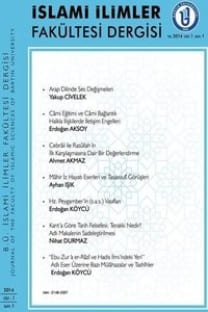AFRİKA TOPLULUKLARINDA ATALAR KÜLTÜNÜN ÖNEMİ VE İŞLEVİ
Atalar kültü, ailenin veya kabilenin ölmüş yaşlı bireyleriyle ilgili inanç, kabul ve uygulamalardır. Bu kült özellikle geleneksel anlayışa bağlı olan topluluklar arasında büyük öneme sahiptir. Geleneksel yaşam tarzı, geçmişteki inanış ve uygulamaların gelecekteki nesiller tarafından yaşatılmasını sağlar. Geleneksel anlayışın hâkim olduğu Afrika topluluklarında da atalar kültü önemini korumaktadır. Afrikalılar ataların kendi aralarında yaşamaya devam ettiğine inanır. Onlar bireysel ve toplumsal hayatın sürekliliği açısından büyük öneme sahiptir. Atalar toplumun varlığı için gerekli olan çocuk sahibi olma ve bereketli ürün elde etmede ciddi fonksiyonlara sahiptir. Onların ayrıca insanları kıtlık, kuraklık ve diğer doğal felaketlerden koruduğu kabul edilir. İşte bu makalede, Afrika topluluklarının hayatında atalar kültünün önemi ve işlevi üzerinde duracağız.
The cult of ancestors is beliefs, acceptances and practices concerningthe dead elderly people of the family or the clan. This cult has a greatprominence among the communities, especially those who have adoptedtraditional understanding. Traditional lifestyles enable past beliefs andpractices to be kept alive by future generations. In African communitieswhere traditional understanding prevails, Ancestral Cult remains important.Africans believe that the ancestors continued to live among themselves.Ancestors have great importance for the continuity of individual and sociallife. Ancestors have serious functions for the possession of children andobtaining wealthy products which is both vital for the existence ofcommunity. They are also considered to protect people from famine,drought and other natural disasters. In this article we will emphasize theimportance and function of Ancestral cult in the life of Africancommunities.
Keywords:
Africa, Cult, Ancestral Cult African Communities,
___
- Akintoye, Stephen, A History of the Yoruba People, Amalion, 2010.
- Anderson, A.H., “African Pentecostalism and the Ancestors: Confrontation or Compromise?”, Missionalia, 21:1, April, 1993, ss. 26-39.
- Arslan, Hammet, Bir Din Araştırıcısı Olarak Geoffrey Parrinder: Hayatı, Bilimsel Kişiliği ve Dinler Tarihine Katkıları, DEÜ, SBE, [Basılmamış Yüksek Lisans Tezi], İzmir, 2004.
- Awolalu J. Omosade, and P. Adelumo Dopamu, West African Traditional Religion, Onibonoje Press, Ibadan, 1979.
- David-Barrett, Tamas & James Carney, "The Deification of Historical Figures and the Emergence of Priesthoods as a Solution to a Network Coordination Problem", Religion, Brain & Behavior, Vol. 6, 2015, ss. 307-317.
- Driberg, J. H., The Secular Aspect of Ancestor-Worship in Africa, Journal of the Royal African Society, 1936.
- Ezenweke, Elizabeth Onyedinma, “The Cult of Ancestors: A Focal Point for Prayers in African Traditional Communities”, Journal of Religion and Human Relations, AJOL, Vol. 1, No: 1 (2008), ss. 1-13.
- Field, M. J., Religion and Medicine of the Ga People, Ams Pr Inc., USA, 1977.
- Field, M. J., Social Organisation of the Ga People, The Crown Agents for the Colony, London, 1940.
- Fortes, M. “Some Reflections on Ancestor Worship in Africa”, Meyer Fortes, African Systems of Thought, Oxford University Press, London, 1965, ss. 122-142.
- Fortes, M., “Some Reflections on Ancestor Worship”, African System of Thought, M. Fortes and G. Dieterlen. London, 1965.
- Fortes, M., Religion, Morality and the Person: Essays on Tallensi Religion, Cambridge University Press, Cambridge, 1987.
- Fortes, M., The Dynamics of Clanship Among the Tallensi, Clarendon Press, Oxford, 1945.
- Fortes, M., The Web of Kinship among the Tallensi, Oxford University Press, London, 1949.
- Foss, Perkins, Where Gods And Mortals Meet: Continuity and Renewal in Urhobo Art, Snoeck Publishers, New York, 2004.
- Frazer, J. G., The Fear of the Dead in Primitive Religion - Lectures Delivered on the William Wyse Foundation at Trinity College, Cambridge 1932-1933, Dyer Press, 2012.
- Genel Türkçe Sözlük, “Kült”, Türk Dil Kurumu. http://www.tdk.gov.tr/index.php?option= com_gts&arama=gts&guid=TDK.GTS.585789d8418321.15898335/15/12/2016.
- https://en.wikipedia.org/wiki/Veneration_of_the_dead/15/12/2016.
- Idowu, E. Bdaji, Olodumare: God in Yoruba Belief, Longman, London, 1970.
- Ige, Simeon Abiodun, “The Cult of Ancestors in African Traditional Religion”, An Encyclopedia of the Arts, Vol. 10 (1), 2006, ss. 26-31
- Jensen, E. and J. D. Krige, The Realm of a Rain-Queen: A Study of the Pattern of Lovedu Society, Oxford University Press, London, 1943.
- K. Amponsah, Topics on West African Traditional Religion, vol. I, Mc Graw-Hill FEP, Accra, 1974.
- Kasenene, Peter, Religion in Swaziland, ABC-CLIO, South Africa, 1992.
- Kopytoff, Igor, "Knowledge and Belief in Suku Thought", Africa, 1981, 51, ss. 709-723.
- Kopytoff, Igor, "Ancestors as Elders in Africa", in Roy Richard Grinker, Christopher Burghard Steiner, Perspectives on Africa: A Reader in Culture, History, and Representation, Blackwell Publishing, 1997.
- Lucas, Jonathan Olumide, The Religion of the Yorubas, Athelia Henrietta Press, 1996.
- Mbiti, J.S., African Religions and Philosophy, Anchor Books Editions, USA, 1970
- Mbiti, J.S., Introduction to African Religion, Sheldon Press, London, 1969.
- Merriam-Webster, “Ancestor cult”, English Dictionary.
- Njoku, John Eberegbulam, The Igbos of Nigeria: Ancient Rites, Changes, and Survival, E. Mellen Press, NY, 1990.
- Obeng, Ernest E., Ancient Ashanti Chieftaincy, Ghana Publishing Corporation, 1986.
- Parrinder, G., African Traditional Religion, Sheldon Press, London, 1974.
- Parrinder, G., Religion in an African City, Oxford Univ. Press, London, 1953.
- Parrinder, G., West African Religion, The Epworth Press, London, 1961.
- Parrinder, G., World Religions: From Ancient History to the Present, Ed., Fact on File Publication, New York, 1983
- Shillington, Kevin, History of Africa, St. Martin's Press, New York, 1995.
- Silverstein, R., Igala Historical Phonology, PhD thesis, University of California, Los Angeles, 1973.
- Tempels, Placide, Bantu Philosophy, HBC Publishing, 2010.
- Tümer, Günay, “Atalar Kültü”, DİA, İsam Yay., İstanbul, cilt: 04, s. 42-43.
- Young, T. Cullen, African Ideas of God, ed. Edwin Smith, Lutterworth Press, Revised edition, 1962.
- Zoma, Goretti, Ceremonies and Festivals: Marriage, Burial, Chieftaincy, and Annual Festivals in Uvwie-Urhobo, Universal Publishers, 2003.
- ISSN: 2148-3507
- Yayın Aralığı: Yılda 2 Sayı
- Başlangıç: 2014
- Yayıncı: Bartın Üniversitesi
